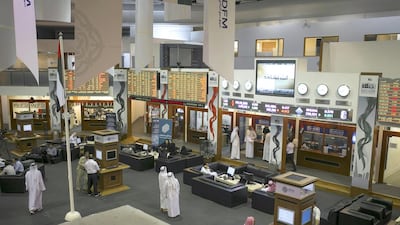The UAE federal market regulator on Wednesday said stockbrokers had the right to liquidate client portfolios if the customer could not cover a margin account.
The statement from the Securities and Commodities Authority (SCA) follows the worst stock market rout since the financial crisis, which investors say has been fuelled by the forced selling of shares by brokers in what are known as margin calls.
“Stockbrokers who sell stocks in the case where the client does not comply with coverage of the gap in the margin account within two working days are not considered to be violating or infringing so long as the company or stockbroker has notified the client of such a gap or drop accordingly with the procedures,” the regulator said.
Stockbrokers say they are enforcing the SCA regulations, in which a broker is required to review margin transaction accounts at the end of each working day and notify the client to cover the account within two working days.
“We are enforcing, not forcing margin calls,” said Fathi Ben Grira, the chief executive at Mena Corp in Abu Dhabi.
Billions of dirhams were wiped from the value of UAE stock market investments this week as investors were spooked by the tumbling price of crude oil, which has lost more than 45 per cent of its June value.
UAE equities took a nosedive this week amid the oil decline. The Abu Dhabi Securities Exchange General Index lost 6.3 per cent this week and the Dubai Financial Market General Index lost 15.6 per cent in the same period.
“SCA is saying the rules and regulations of margin, but you can read between the lines,” Mr Ben Grira said, referring to the announcement.
“What they are not saying, and can’t, is that the problem comes from banks financing the clients. ”
Mr Ben Grira was referring to a report in Al Ittihad, the sister Arabic language newspaper of The National, that said the Central Bank had asked lenders to report the size of financing given to clients facing margin calls.
The report said one Dubai bank forced an Abu Dhabi investor to liquidate a Dh400 million portfolio to cover his position.
The SCA is not empowered to regulate activities by banks. It can only regulate and enforce decisions on stock brokerage firms. Only the central bank has the power to regulate lenders.
The SCA’s announcement came on a mixed day for the UAE’s stock markets, after a record day of sell-offs on Tuesday.
Brokers said that margin calls were to blame for a flurry of late sell-offs on the DFM on Wednesday, erasing the index’s gains of the day.
After opening down, the DFM spent most of the day in positive territory, rising by as much as 2.7 per cent in the early afternoon, before retreating in the final hour of trading to close down 1.64 per cent at 3,033.
Property and construction stocks were among the worst performers of the day, with Deyaar Developments, Arabtec Holding and Drake and Scull International all falling more than 9 per cent on the day.
The downwards trend was bucked by Emaar Malls, which gained 5.69 per cent at Dh2.60. Emirates NBD rose by 4.91 per cent to Dh6.41.
About 725 million shares were traded on the bourse on Wednesday, its highest volumes since July.
The picture was more positive in the capital, where surging bank stocks helped the ADX recover some of Tuesday’s losses. A flurry of trades in the afternoon session resulted in the bourse’s general index closing up 5.11 per cent at 4,090.99.
Banks and financial services companies were the main risers of the day, led by Finance House (up 14.41 per cent) and the index heavyweight FGB (11.19 per cent). Waha Capital, ADCB and NBAD all rose by more than 7.9 per cent.
The UAE’s mixed day was representative of other markets in the GCC. Saudi Arabia’s Tadawul ended down 5.03 per cent, with Qatar and Oman posting gains of 1.12 and 1.35 per cent respectively. Bahrain and Kuwait, meanwhile, posted modest losses of 0.32 and 0.82 per cent.
halsayegh@thenational.ae
jeverington@thenational.ae

